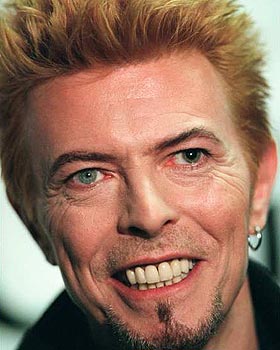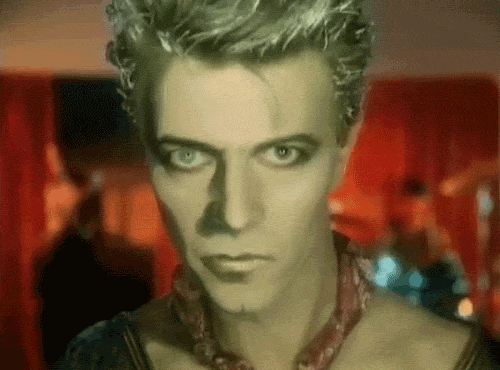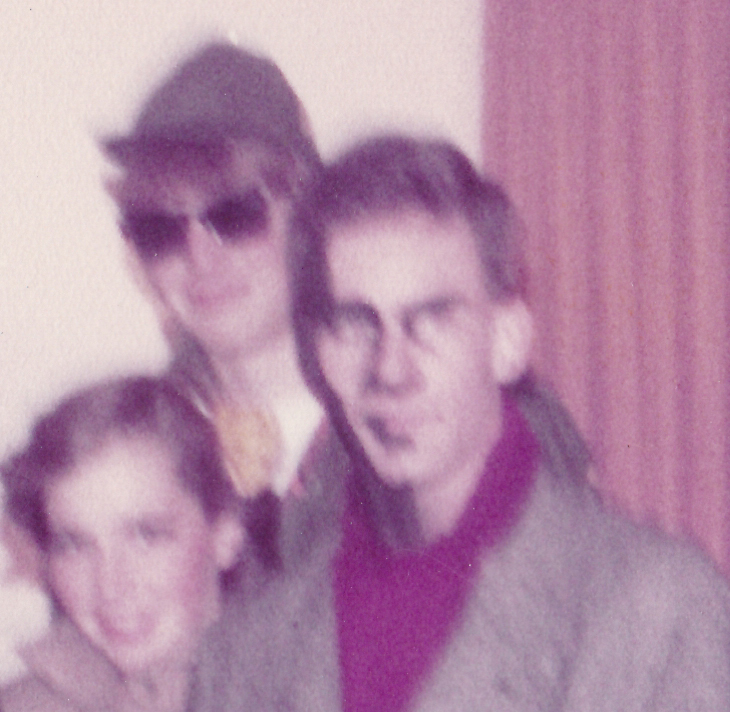It seems impossible that he's gone. If anyone on Earth seemed otherworldly enough to transform himself into something eternal and transcendent, it was Bowie. But even he tried to remind us in 1997 that he was not really an alien but an Earthling.
His death hit me harder this morning than I would have expected (as is no doubt true for all of us). I haven't felt this devastated at a musician's death, in fact, since 1990, when Stevie Ray Vaughan died in a helicopter crash. (And is it coincidence that Bowie had helped raised Vaughan's profile, as he did with so many other musicians?)
I came to Bowie "late," as I didn't really start paying attention to his music until 1983, when I was 16. Let's Dance ruled the charts, but it was generally held that his important work was all behind him and he was now selling out. None of that mattered to me, though. I knew some of his earlier music because he was one of the few '70s artists who was played on my favorite Utah new wave station. But Let's Dance was a perfect album for my generation—consummate pop you could move to on the dancefloor while still feeling smart. And Bowie himself seemed the epitome of suavity and cool.
A year later, when I was starting college, I remember sitting in the foyer of the Student Union at the University of Utah, where a large screen TV that showed MTV all day was set up in front of about twenty folding chairs. That's where I watched the debut of the full 20-minute short film "Jazzin' for Blue Jean," in which Bowie played two roles, including Byronesque pop star Screaming Lord Byron. I so much wanted to be David Bowie that I tried painting my face like Screaming Lord Byron that Halloween. Despite the ubiquity of the shorter "Blue Jean" video, not many people could tell what I was going for, and I spent a lot of time explaining who I was supposed to be.(Another great memory I have from the U.'s Student Union is the time I dragged my ultra-Mormon pal Steve there to see a showing of the The Hunger, which featured Bowie as a sexy vampire. I think it may have scarred him for life.)
I next connected with Bowie when he formed the grungy hard-rock band Tin Machine. I was a huge fan of their 1989 debut album, but then Bowie sort of fell off the map for me again. I reconnected permanently in 1997, as Earthling was being released. This was also just as I started working at N2K Entertainment as a web developer for a site called Rocktropolis.com. The company was partnered with Bowie in launching his forward-looking Bowie.net ISP, and we helped stream a groundbreaking live webcast of his Earthling concert from Boston that March. I played Earthling incessantly, and from then on I kept up with all his new releases, and began exploring backward to start understanding what I'd missed.
Sadly, I only saw him play live once, at the Beacon Theater on October 20, 2002, on his New York Marathon tour of all five boroughs. It was a tremendous show. More recently, we were lucky enough to be able to fly to Chicago to see the David Bowie Is exhibition at the Museum of Contemporary Art. That was an amazing experience, filled with immersive sound, video, costumes, handwritten lyrics, and more. We spent at least four hours wandering back and forth through all the rooms, trying to take in everything. I do not exaggerate when I say it was the best museum show I've every seen.
His productivity and restless experimentation have long been an inspiration and example, to the point that in my short story "Subterraneans" (published in the Glitter and Mayhem anthology) I crammed as many Bowie references, both overt and oblique, as I could. (You can hear a soundtrack to the story here.)
Just this past Friday night, I went with Paul Witcover to see Holy Holy play at the Highline Ballroom. This tribute band, of sorts, was created by Bowie's former drummer Woody Woodmansey and his former bassist and longtime producer Tony Visconti, to play The Man Who Sold the World in its entirety. (Woodmansey and Visconti both played on that album.) Since Friday was Bowie's birthday, not to mention the release date for his new album Blackstar (which Visconti produced), I think everyone in the audience secretly hoped he might show up to sing a couple of songs.
That didn't happen, but at one point Visconti took out his cellphone and called Bowie so we could all sing him "Happy Birthday."
Did Visconti really get him on the phone? I don't know, and I'm not sure it matters. If it was only an illusion that Bowie could hear us singing, well, much about David Bowie was an illusion. And I would rather that illusion than the reality that, as we sang, Ziggy Stardust lay dying.
Today, all of Planet Earth is blue; most of us, I'm sure, can tell the stories of our own particular relationships with David Bowie. But as my friend Miguel texted to me a little while ago (quoting a tweet by Dean Podestá that was itself widely misattributed to Simon Pegg):
"If you're sad today, just remember that the world is 4 billion years old and you somehow managed to exist at the same time as David Bowie."
Amen.
One last thought. Much has been made today of the allusions to mortality and dying in Blackstar and especially "Lazarus." But lest we forget, death and horror have always played a role in Bowie's art. He was always conscious of his mortality, even if we were not.




